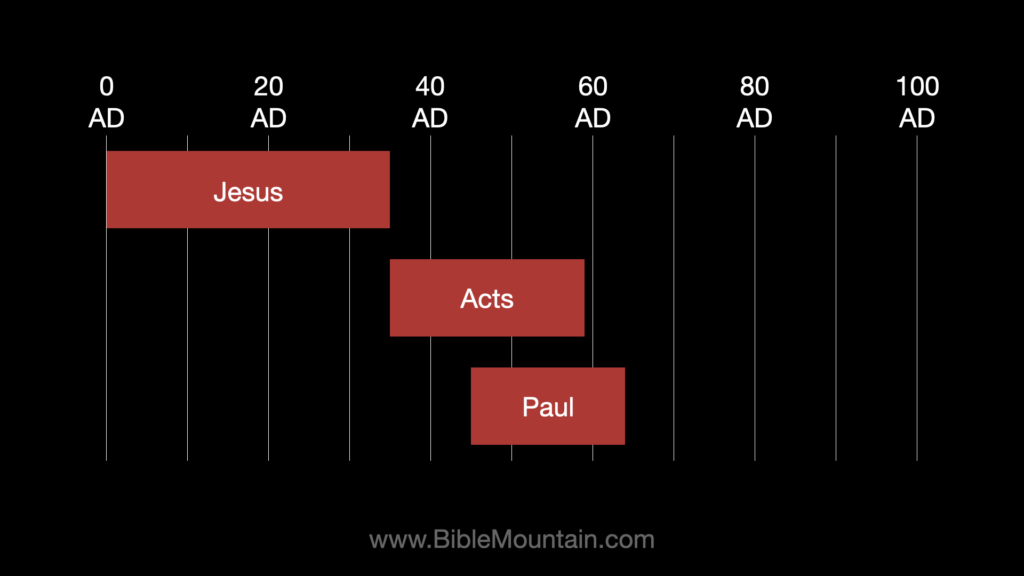Historical Context of Philemon
This is the third lesson in a series of lessons on the book of Philemon. In this lesson I'm going to talk about how Philemon fits into history.
Watch the video or scroll down to read a transcript.
Transcript:
Thanks for visiting Bible Mountain. This is the third lesson in a series of lessons on the book of Philemon. In this lesson I'm going to talk about the historical context of Philemon.
In the first lesson I talked about why. Why is Philemon in the Bible? We learned that Philemon tells us a story of a man named Philemon and a slave named Onesimus. This short little story is an illustration that illustrates for us how to live out commands elsewhere in the Bible, given to masters on how to treat their slaves and given to slaves on how to submit to their masters.
We also learned that this story is still relevant for us in the 21st century, because even though slavery is illegal, we have scenarios in our culture where some people exercise authority over other people. There are also commands in the Bible that give us instructions about that. The story of Philemon and Onesimus illustrates for us how to live out the commands that are given to those who exercise authority and to those who submit to authority, particularly when one or both is a follower of the Lord Jesus Christ.
In the second lesson I looked at the biblical context. I showed how slavery shows up throughout the Bible. It's mentioned many times in the Old Testament. It's also mentioned in the New Testament. I explained the biblical context in which the Book of Philemon was written.
What I want to do in this lesson is talk about the historical context and put a lot of that information on a historical timeline. This is to understand the events that led up to the book of Philemon so we can understand, in its historical context, why Philemon was written and what the lesson is for you and me.
Here we have a timeline of world history. In the upper left is 4000 BC. That’s roughly when creation happened. In the upper right is 2000 AD. That’s roughly when you and I are living. The Old Testament tells us about people and events from 4000 BC up to about 400 BC. The New Testament tells us about people and events from the first century AD.
As I mentioned, creation happened about 4000 BC. After creation, men began to multiply, but they became very sinful. Then we read about the life of Noah. During the days of Noah, God brought a flood to destroy all people because they were so sinful, but he saved Noah and his family in an ark. Noah live around 2500 BC.
After the flood, men began to multiply again, and they started to populate the earth. Then we read about a man named Abraham. Abraham lived around 2000 BC. It was during the life of Abraham we first read about slavery in the Old Testament. Abraham had servants who he had bought with money. We also read that Pharaoh gave some servants to Abraham. So we see a very clear reference to slavery in the life of Abraham.
Abraham had a son named Isaac. Isaac had a son named Jacob. Jacob had 12 sons. One of Jacob's sons was Joseph. We read that Joseph was sold as a slave into Egypt. After Joseph was in Egypt, Jacob and his other sons, and all of his descendants, also moved to Egypt and lived there for the next 400 years. During that time, the Egyptians turned the Israelites into slaves.
Then we read about Moses leading the Israelites out of Egypt, out of slavery, towards the Promised Land. Moses lived roughly 1500 BC. After Moses died, the Israelites went in and conquered the promised land. They lived there for several hundred years during a time period when every man did what was right in his own eyes.
Eventually, the Israelites demanded a king. At first, God gave them King Saul, but that didn't work out. Then God gave them King David. David lived roughly 1000 BC. After David died, his son Solomon became king. During the life of Solomon, we read that Solomon built his palace and the temple. He used forced laborers for those building projects. So we see another reference to slavery.
After Solomon died, the kingdom of Israel was split into two. There was the northern kingdom and the southern kingdom. Those kingdoms existed for several hundred years. Over time, they became more and more sinful. Eventually, God brought in the Assyrians to conquer the northern kingdom. Then he brought in the Babylonians to conquer the southern kingdom.
The Babylonians took a lot of Jews back to Babylon as exiles. Daniel was one of those exiles Daniel lived approximately 600 BC. Exile is a form of slavery because the Israelites were forced to leave their homeland and go to Babylon. After that, there were about 400 years between the Old Testament and the New Testament.
Then in the New Testament, we read about the birth of Jesus and his life here on Earth. We read about His death, burial, and resurrection. During Jesus's ministry, He made reference to selling and buying people as slaves. That tells us that slavery existed in the first century AD, more specifically, it existed within the Roman Empire, which is the Empire within which Jesus lived.
The book of Acts, and a lot of the letters in the New Testament, were written within the boundaries of the Roman Empire. Slavery was legal in that area. For that reason, Paul, in his writings, gave instructions to masters on how to treat their slaves. He gave instructions to slaves on how to submit to their masters.
And we have the book of Philemon, which is the subject of this series of lessons. Philemon is a short story about Philemon and Onesimus which illustrates for us how to live out the commands that Paul gave to masters on how to treat their slaves and to slaves on how to treat their masters.
By the end of the first century AD, the Bible was complete. Since that time, we have lived in something known as the church age. During this time, the Bible has been our guidebook. It has been a source of truth. There are commands in the Bible which we have to follow. The Bible tells us how to live on Earth as followers of the Lord Jesus Christ.
Here in the 21st century, it's easy to think Philemon is not practical or relevant for us because, for the most part, slavery is illegal. However, let's keep in mind that for most of the past 2,000 years of church history, slavery has been legal. Therefore, for most of church history, the illustration in Philemon has been very relevant to Christians and their lives.
Even though slavery is illegal today, we live in a culture where some people exercise authority over other people, and there are commands in the Bible that pertain to those situations. The story of Philemon and Onesimus also illustrates for us how to live out those commands. Therefore, the book of Philemon is still relevant for us living in the 21st century.
Let's go back to the first century AD. This is the time period when the New Testament was written. On the left is 0 AD which is roughly the birth of Christ. Off to the right is 100 AD.
Jesus lived on earth from about 0 AD up to the mid 30s AD. As I mentioned earlier, Jesus made reference during his life to buying and selling people as slaves. After Jesus went back to heaven, His apostles went out and shared the good news of Jesus throughout the Roman Empire. We read about that in the book of Acts.
During those events, we read about the Apostle Paul. Paul is a main character in the latter half of the book of Acts. Paul’s ministry was roughly from the mid 40s AD up to the mid 60s AD.
During that time, Paul was traveling around, sharing the good news of Jesus, and writing his letters. Paul's ministry took place within the Roman Empire. Slavery was legal, and so the commands that Paul gave in his writings to masters and slaves were very relevant to them. Paul also wrote the book of Philemon, which illustrates how to live out the commands that he gave elsewhere in his writings.
What we've learned as we've looked at the historical context of Philemon is that slavery is something that has existed throughout human history. It has been a common part of the human experience.
Slavery was mentioned throughout the Old Testament. Slavery was a reality in the Roman Empire during the time of Jesus. Jesus made reference to buying and selling people as slaves. Paul gave commands to both masters and slaves on how to treat each other, particularly when one or both of them was a believer.
Even though slavery is illegal in our culture, the book of Philemon is still relevant to us. The Book of Philemon is a short little story that illustrates how to live out the commands that were given to masters and slaves. That's relevant to us, because in our culture we have situations where people exercise authority over other people. There are Christians who exercise authority over other people. There are Christians who have to submit to those in authority over them. Sometimes Christians exercise authority over other Christians.
As followers of the Lord Jesus Christ, we have to live in that system of authority, that authority structure, but at the same time, we are brothers and sisters in Christ. When a believer exercises authority over another believer, they're justified in exercising that authority, and the ones under authority have to submit to that authority. However, at the same time, they have to treat each other as brothers and sisters in Christ. The book of Philemon is a short little story that helps us think through how to do both at the same time.
Thanks for visiting Bible Mountain. If you're already a member of my email list, thank you, and please forward this to someone else who you believe would benefit from Bible Mountain. If you haven't already joined my email list, please do so now. This is the best way to make sure you receive all my free content. My email list is free. In order to join, go to www.BibleMountain.com, click on email, and that will take you to a web page where you can sign up. Your email address will not be sold nor given away.
Once again, thanks for visiting Bible Mountain.
Scripture quotations from Philemon taken from a translation by Bible Mountain.
“All other Scripture quotations taken from the New American Standard Bible®,
Copyright © 1960, 1962, 1963, 1968, 1971, 1972, 1973,
1975, 1977, 1995 by The Lockman Foundation
Used by permission." (www.Lockman.org)




